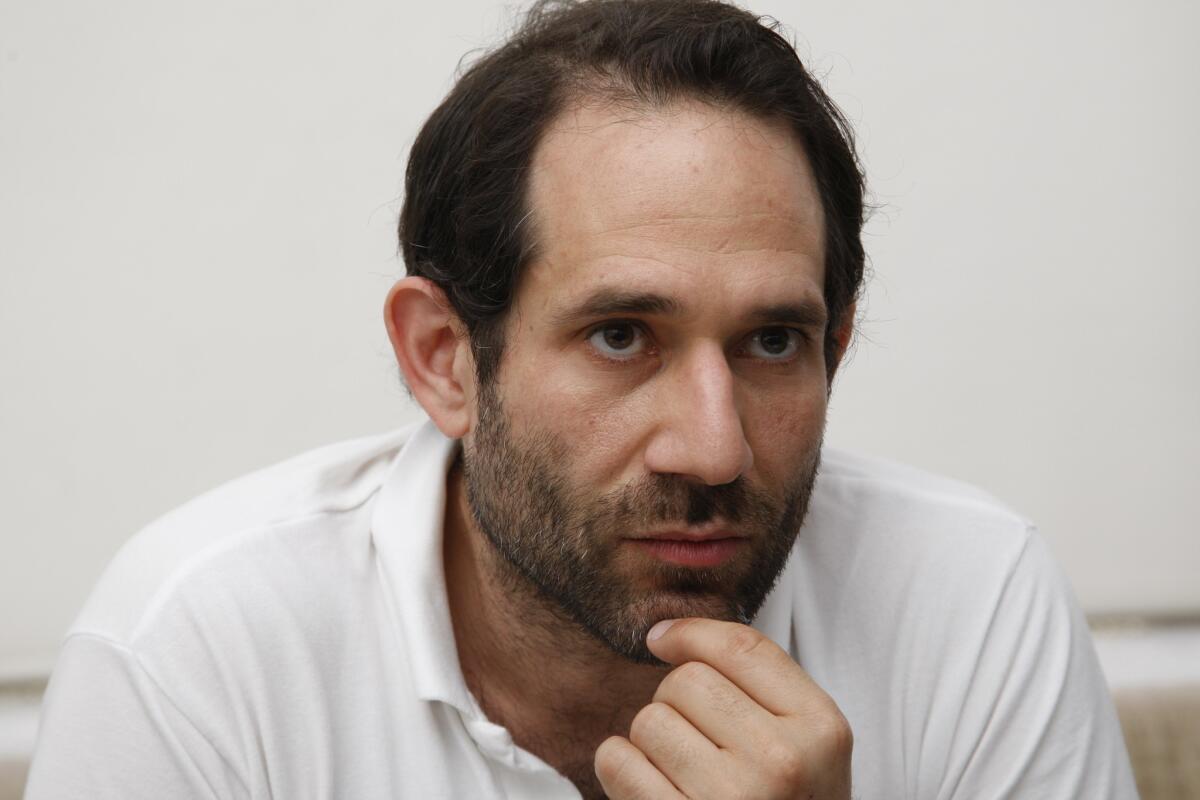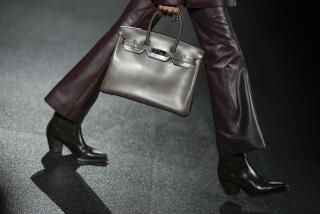Dov Charney testifies: American Apparel’s ‘impossible’ board won’t give him a fair shot

Dov Charney has been fighting to regain control of American Apparel since he was ousted as chief executive in 2014.
WILMINGTON, Del. — Dov Charney’s final stand took place in Courtroom No. 1 of U.S. Bankruptcy Court.
On Thursday, Charney testified in what could be his last chance to sway the fate of American Apparel Inc., the company he founded and from which he was ousted as chairman and chief executive in 2014. Both he and American Apparel executives are trying to convince the bankruptcy judge that their plans are in the best interest of the Los Angeles firm and its creditors.
After closing remarks, Judge Brendan Shannon said he would rule Monday.
Charney spent about two hours recounting his decades-long journey from college T-shirt salesman to successful entrepreneur — and his ultimate downfall.
American Apparel’s board fired him after an investigation uncovered allegations of misuse of company funds and inappropriate behavior with employees. Charney has denied the accusations.
Since then, Charney said, he has repeatedly tried to wrest back control. On the stand, he painted himself as a businessman wronged, thwarted in his comeback attempts by an “impossible” board.
“There’s no chance I can ever have a fair shot,” he said.
“I don’t want to hand over my company,” Charney added. “This is coercion.”
American Apparel filed for Chapter 11 bankruptcy protection in October in Delaware, where it is incorporated. The company supports a reorganization plan that would take it private and hand nearly 100% control to its largest bondholders. Shareholders, including Charney, would be left with nothing.
Charney supports an investor group that submitted two takeover offers in recent months, including a $300-million bid that was rejected last week by American Apparel’s board. The investors, which include Hagan Capital Group, support Charney’s return as co-CEO.
Chad Hagan, managing partner of Hagan Capital, said Thursday that American Apparel didn’t take the two offers seriously, possibly because of the group’s affiliation with Charney.
Charney’s turn on the stand was unusual compared with the staid nature of most corporate bankruptcy proceedings.
He was an animated presence — hands flailing, eyes wide, with a voice that carried to the back of the courtroom. He cracked jokes and went off on tangents; at one point, the judge cut him off, saying Charney was “free associating,” and practically everyone in the courtroom laughed.
He wore his trademark white sneakers and a gray suit — the same one, he said, he wore in June 2014 when he was fired as chairman and suspended as CEO. (Charney was fired from the CEO job in December 2014.)
When discussing American Apparel’s troubles regarding undocumented immigrants in its workforce, he choked up.
“I felt that I was doing something that was creative. If it was unorthodox, it was meant to be,” he said. “I’m a merchant, I’m a creative artist, I’m a photographer, I’m a marketer, I’m an industrialist.”
At the time of his ouster, Charney said he was confident of American Apparel’s direction. “This was not a company in need of a turnaround,” he said. Then, Charney testified, he was thwarted by what he characterized as corporate villains.
Those included John Luttrell, the chief financial officer who served as interim CEO after the firing. Charney also accused several board members of plotting against him. During his showdown with the board, Charney said, he was offered $4 million in severance over four years, along with a consulting job for $500 an hour, if he gave up his shares.
He criticized American Apparel’s current management, which he said fired the company’s top creative minds, and also Standard General, a hedge fund that lent the company millions. Charney had originally joined forces with Standard General in a takeover attempt, but the hedge fund ultimately decided not to support his return.
“There’s no way I can get past all these corporate forces,” he said. The company, he said, is “disintegrating” and at risk of shutting down.
American Apparel’s counsel declined to ask Charney any questions but did make a motion to strike all of his testimony, contending that much of what he said was hearsay. The judge said he would take into account that there was another side to the story.
The hearing started Wednesday with testimony from Paula Schneider, who took over as chief executive last year.
Schneider said that American Apparel lacked a more typical corporate structure or chain of command when she started, according to media reports.
Under the reorganization agreement submitted by American Apparel, more than $200 million in bonds would be eliminated in exchange for shares in the reorganized company — a transaction known as a debt-for-equity swap. The participating lenders are led by hedge fund Monarch Alternative Capital.
Whoever wins control will have a private company in need of significant changes.
The clothier hasn’t turned a profit since 2009. A yearlong turnaround implemented by Schneider has failed to boost its sagging sales. In November alone, the retailer reported a net loss of $14.5 million, according to its monthly operating report.
In his closing statement, Scott Greenberg, an attorney for American Apparel, said the bidding process was fair and that Charney’s involvement in the takeover bid did not influence the board’s decision to reject it. The bid, he said, simply wasn’t as strong as the company’s own reorganization plan.
Charney’s statement that the company isn’t viable without him, Greenberg added, is simply untrue.
shan.li@latimes.com
Twitter: @ByShanLi, @ashleypowers
Special correspondent Powers reported from Delaware and Times staff writer Li from Los Angeles.







